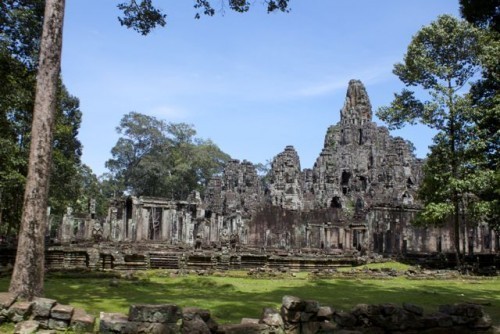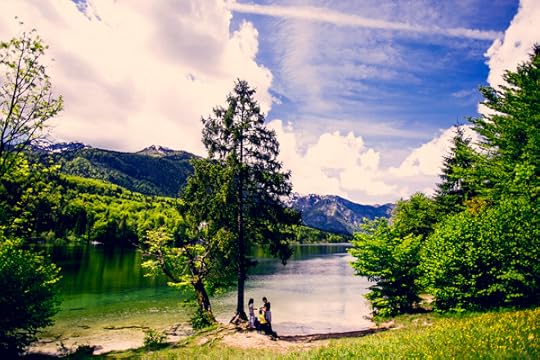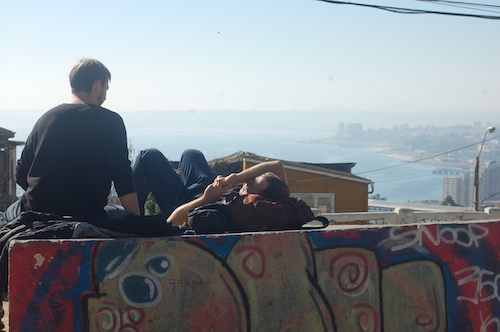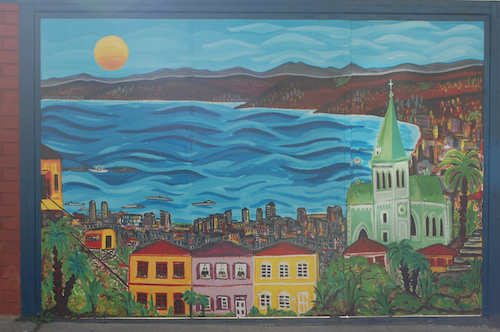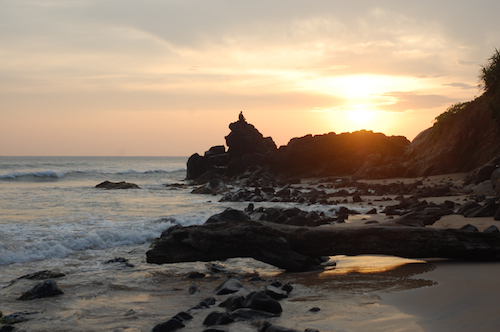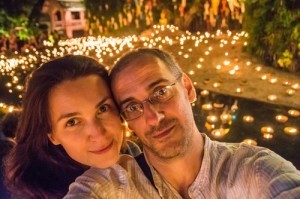Rolf Potts's Blog, page 36
June 24, 2014
Vagabonding Field Report: Jervis Bay and Huskisson: Grey nomads and toe licking possums.
Vagablogging :: Rolf Potts Vagabonding Blog
Cost/day
Green Patch camp in Jervis bays Booderee National Park is cheap as Chips, there is nothing here that asks you to spend money, only the camping pitch which is around $30 to $40 a night. This is money well spent for a beautiful haven of wildlife, woodland and beaches. If you have yourself a supply of food, you won’t find yourself spending a cent more. Barbecue areas exist but may need a good hose down before cooking!
Huskisson however is a small fishing town with various Whale Watching and Dolphin tours around the area. Various restaurants and shops line the Main Street. So you might find yourself spending a little more enjoying the area.
Describe a typical day
Jervis Bay is not a roller coaster of excitement which is the beauty of the National Park. It is a calm, tranquil, secluded piece of New South Wales.

From our camper we cooked ourselves some bacon and eggs and sat at our camping table and submersed ourselves in our surroundings. Wallabies bumble about undisturbed by your presence. Various parrots and other colourful birds swoop around the green canvas of the trees that make up the woodlands. We entertained ourselves for a while before grabbing a towel and heading for the beach.
Jervis Bay has many walking trails around the different sections of the National Park. We wandered for a good hour taking in the fresh air and luscious greenery and calm before settling on the beach.
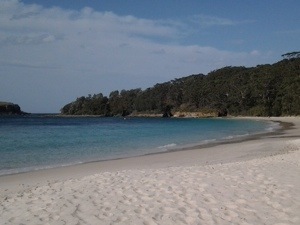
We were told that it was the whitest sand beach in the world (although I’m sure many other beaches may say the same) and it was certainly the whitest sand we had ever seen. It seemed so pure and clean, untouched by any other elements. The sand crunched under our feet, reminiscent of fresh snow fall under boots. The beach stretched across the cove from the rocky edges that held several fisherman to the merging edge of the woodlands. The beach was almost deserted and blissfully quiet. So we sat watching the waters lap the white sands, we let the sun beat down and read our books.
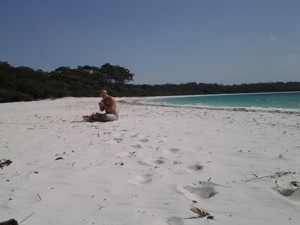
Later that day we had booked ourselves on a trip out into the waters with the promise of some Humpback Whale Watching, so we took our camper for a quick drive to Huskisson. A large speed boat waited for us and we climbed aboard and set off out to sea. The rough nature of the waters made for a great deal of fun on our search for sea life.
A very knowledgable tour guide talked us though the story of the bay – yet another discovery of Captain Cook. For a while it seemed we had paid for nothing more that a boat ride. Everyone’s eyes were peeled and eager to spot something but to no avail. The odd wave gave a little excitement of a possible whale spot here and there. Then after a long wait and from out of the blue a large juvenile male whale wanted to give us a show. For almost twenty minutes we watched from almost 50 feet away this beautiful creature diving from the waters and blowing water to our amazement. Many of the tourists clambered over each other for a good picture.
Before long the whale had grown tired and moved on as did we. We were on our way to a small rock that was home to a large family of seals which again we were excited to see. At about five minutes into our journey a small asian lady spotted some unexpected sea life, from each side was the fantastic sight of a pod of dolphins as they followed the boat at great speeds. They threw themselves from the water in synchronised acrobatics. We watched for a good ten minutes before another magnificent show was over. The trip was turning out to be more than we had expected!
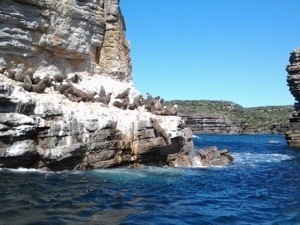
To end the tour we approached the seal rock where we found many seals sunbathing, unaffected by us being there. We watched as they went about there buisness; it was great to observe them as they dived into the sea and swim happily. We listened to their playful calls and snapped many photos. Before long It was time to head back to shore.
br />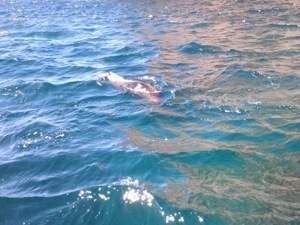
Back on land we had ourselves a fish and chips by the sea and bought some meat for our evening barbecue.
On our return to Jervis Bay,
we settled for the night and enjoyed a beautiful unblemished sunset. We sparked up a barbecue and enjoyed the company of an elderly Australian couple that had pitched next to us. After a long day we retired to bed.
What’s the strangest thing you’ve seen lately?
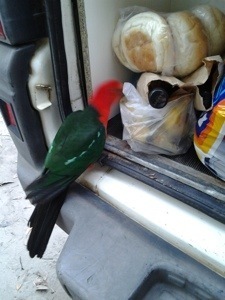
The local wildlife here has to be the tamest I have seen in Oz, or anywhere for that matter! The local parrots were very fond of our bananas and would gather in the trees around our camp. At any given opportunity they would swoop in numbers and attack our food bags. Watching a brightly coloured bird try and fly off with a banana is amusing in itself. However even after sundown there was no escaping the hungry undeterred wildlife. As I sat tucking into a burger I couldn’t help ponder what the sensation was around my toes. With a torch in hand I had a startling moment when I noticed a possum happily licking my big toe! To say I was quick to leap up from my chair was an understatement! Although as quick as I was to jump up, so were the surrounding gang of possums just as quick stealing a loose sausage from our plate and running off for a late night snack. They were just as cute and amusing as they were devious rascals so we had a good laugh with them.
Describe an interesting conversation you had:
We were very fortunate to have been pitched next to a lovely elderly couple Steve and Leslie. You couldn’t have found a happier pair of folks. We spoke for sometime about our travels, England and other general chit-chat.
What was interesting was they described themselves as the “Grey Nomads” part of a generation of retirees who, in their own words, wanted to “spend our children’s inheritance on ourselves”. They had quite simply sold their house, bought a camper and hit the road.
They had more knowledge than we could take in. They gave us great places to visit, taught us some great amusing Aussie lingo and they shared many stories and made us chuckle all night. The beauty of meeting this great couple was their firm idea of choosing not to live out retirement as a pensioner with nothing more to contribute to the world. They made sure every penny and every piece of hard work and graft in their nearly 70 years paid off. They made sure they had earned the right to be happy and enjoy their freedom.
This really opened my eyes to the Australian culture. On reflection it seems that the English culture seems to be that you work your entire life, grow old and die (not all English OAP’s live like this but a large percentage) and hitting retirement means you hang up your hat and become useless and boring.
The Grey Nomads of Australia are abundant and it seems to be the best years of many of their lives. Steve and Leslie were full of life, happy and above all seemed unburdened by getting old. I wish them many more happy years. A truly inspiring couple.
What do you like about where you are? Dislike?
It was peaceful, calm and full of amazing wildlife. Our trip to Huskisson was an amazing day out and shouldn’t be missed by any travellers to the area.
The only dislike is the lack of clean BBQ areas.
What new lesson did you learn?
That getting old is inevitable but life is to be enjoyed how ever many years you’ve seen. Steve and Leslie really opened my eyes to the idea that even in my golden years there shouldn’t be a reason I can’t still be living the life I’m leading now. Just be happy and enjoy the fact your still breathing.
Where next?
Phillip Island!!!
Follow me on Instagram: Evolvedsky
Original article can be found here: Vagabonding Field Report: Jervis Bay and Huskisson: Grey nomads and toe licking possums.
June 23, 2014
Vagabonding book club: Chapter 8: Keep it real
Vagablogging :: Rolf Potts Vagabonding Blog
“In reality, travel is not a social contest, and vagabonding has never represented a caste on the tourist/traveler hierarchy. Depending upon circumstance, a sincere vagabonder could variously be called a traveler or a tourist, a pilgrim or a satyr, a victor or a victim, an individual seeker or a demographic trend. Indeed, the main conceit in trying to distinguish travelers from tourists is that you end up with a flimsy facade of presumed insiders and outsiders. By the vacuous standards of fashion, insiders and outsiders are necessary, but in the realm of travel (where, by definition, you are always a guest in foreign places) such a distinction is ridiculous. Putting on a cocksure and superior air may win you points at a nightclub in your hometown, but such pretense on the road will only cheapen your travel experience.” — Rolf Potts, Vagabonding: An Uncommon Guide to the Art of Long-Term World Travel
This is a particular pet peeve of mine: the tourist vs. travel debate and its associated snobbery. There is nothing more off-putting to me, in meeting another vagabond, than to hear her speaking with disdain about “those people” who got off of the tour bus, kept together in a group, followed their guide with a carnation on the tip of his umbrella held high, and took their tour of the colosseum in Rome.
It’s true, that group travel and organized tours are not my preferred method of exploring the world. The sentiment behind her disdain is one that I share: the value of owning one’s own time, discovering a place without the pre-chewed experience, specially designed to make sure you don’t miss anything and come away knowing the basic facts. I travel to interact with a world I don’t know about, with people I don’t understand yet, and to do that in my own way, and in my own time. Thus, the “tour package” deal isn’t my thing. But that doesn’t mean it’s of no value.
Which is better: to stay home because the world is too scary and you don’t know where to start, or to take a three week packaged tour through China? To take the packaged tour through China, of course! Some exposure is better than none. Some experience is more educational than none. For many, two weeks vacation is all they get, that should be used to the best of their ability to travel, if they have a desire to do so. For lots of people, purchasing a well organized “tourist” experience is the gateway that broadens their horizons and builds confidence while reducing their fears to the point that, perhaps later, they can branch out on their own.
Seasoned travelers tend to wear their adventures like boy scout badges and arrogantly point them out. This is unattractive. Instead, those of us who’ve been around two or three or fifty blocks, should be the first to quietly applaud the first tentative steps that others are taking. We should be there to validate their experiences and encourage them to take the next steps. It’s not a contest, it’s a path we walk together. Travelers are often tourists, or at the very least, they were once. Tourists are also travelers and, given enough adventures, will eventually meet the real world on their own terms.
Do you consider yourself a tourist or a traveler? Do you think there’s a difference? What has been your experience?
Original article can be found here: Vagabonding book club: Chapter 8: Keep it real
June 22, 2014
Paul Theroux on the “romantic voyeurism” of the traveler
Vagablogging :: Rolf Potts Vagabonding Blog
“The traveler is the greediest kind of romantic voyeur, and in some well-hidden part of the traveler’s personality is an unpickable knot of vanity, presumption and mythomania bordering on the pathological. This is why a traveler’s worst nightmare is not the secret police or the witch doctors or malaria, but rather the prospect of meeting another traveler.”
–Paul Theroux, Ghost Train to the Eastern Star (2008)
(2008)
Original article can be found here: Paul Theroux on the “romantic voyeurism” of the traveler
June 21, 2014
Roadtrip: Czech Republic, Austria, Slovenia, Croatia
Vagablogging :: Rolf Potts Vagabonding Blog
I recently had the experience to travel by car from Czech Republic to Austria, Slovenia, Croatia, and back. I was in the company of my fiance and his mother, the latter speaking only Czech, while I speak almost only English. Our situation had an interesting dynamic, but we had a lovely week camping, walking around cities, passing time in the car, and trying out local food. Unfortunately the weather was colder and rainier that we had hoped for, and camping in thunderstorms and snow was quite an unexpected adventure.
We started in Prague, and headed south to Austria. We didn’t have much of a plan, just a week to spare for traveling, and our first night we wound up camping on the side of the road. We cooked a small meal and went to bed somewhat early to get a quick start the next day.
We stopped briefly in Mariazell, Austria, but other than that we were in a rush to get to Slovenia. We found a campsite in near Lake Bled that was really really nice. They had showers, a pub/restaurant, free wifi, and the grounds were well kept and clean. A few miles walk through the woods and along the road would lead you to Lake Bled. The weather was perfect.
Lake Bled was probably one of the most picturesque places I’ve been. There are swans, castles, a thick forest, and the sunset over the lake was perfect. The campsite near by was fun, but I can imagine that staying in a hotel right on the lake would be a very nice experience as well.
After a couple of days in Slovenia, we headed to Croatia. Our first stop was at the waterfalls in Plitvice. The entrance fee was around $30, but the views were worth it. We only had a couple of hours because we got there later in the day, but again, worth it. We camped in Plitvice for the night, where it stormed non-stop.
The next day, we stopped in Split for a few hours, then stayed at a hotelin Brela, a town on the coast. In Split, the old town area was amazing, the ground was and walls were white stone, everything so bright in the sun you almost couldn’t look.
Brela was the perfect seaside town to spend time relaxing and strolling along the coast. The sunset was intense and drawn out.
Driving through Croatia was weird. Sometimes the highway would just suddenly be shut down, and you would have to find an alternate route to where you were going. There were abandoned buildings and houses along the way, the signs of recent war obvious. Still, the coast and mountains were breathtaking.
Original article can be found here: Roadtrip: Czech Republic, Austria, Slovenia, Croatia
June 20, 2014
Dealing With the Beggar Issue
Vagablogging :: Rolf Potts Vagabonding Blog
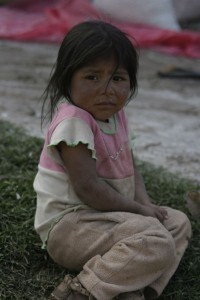 Should you ever travel to Santo Domingo, the capital of the Dominican Republic, there’s a good chance you’ll meet Francisco in the city’s humid, touristy colonial zone. Barefoot, emaciated, and filthy from sleeping in the street, Francisco looks far older than his 19 years, and his wavering gaze carries a look of hardened desperation.
Should you ever travel to Santo Domingo, the capital of the Dominican Republic, there’s a good chance you’ll meet Francisco in the city’s humid, touristy colonial zone. Barefoot, emaciated, and filthy from sleeping in the street, Francisco looks far older than his 19 years, and his wavering gaze carries a look of hardened desperation.
I met Francisco — or, rather, he made it a point to meet me — when I was sitting on a bench near Independence Park, on my first full day in the city. After chatting me up for a few minutes (asking how I liked Santo Domingo, and inquiring about my favorite baseball teams) Francisco got down to business. “I’m homeless,” he said, “and I haven’t eaten all day. Can you give me 100 pesos for some food?”
I’d sensed this was coming, but something seemed a little suspicious about Francisco. “You speak great English,” I said. “You must be educated.”
“I’m not educated,” he said. “Not really. I lived with my uncle in New Jersey for a couple years, but they made me leave the country after 9/11, and it’s hard to find work here in Santo Domingo. Please, 100 pesos is nothing for you. It’s not even three dollars.”
This was true enough — and it was obvious that Francisco had indeed been sleeping in the street — but I’d never been comfortable handing out money to strangers. “I haven’t had lunch yet,” I said. “Come to the restaurant and eat with me.”
Francisco agreed to come, though he seemed vaguely disappointed by the proposition. When we got to a nearby cafeteria, he suggested I just give him the 100 pesos, claiming he could get bigger portions at a restaurant in a poorer neighborhood. When I suggested we go to this restaurant together, Francisco said it was too far away to walk, and asked again for 100 pesos. I refused, and when our sandwiches arrived, Francisco continued to goad me for money. Eventually I became irritated, and slapped down 50 pesos.
Francisco took the money, finished his sandwich, and was gone in under a minute, leaving me to deal with the sickly mix of emotions I feel whenever I wind up in such situations: anger, pity, resentment, guilt.
Over the course of the next week in Santo Domingo, I slowly discovered just how ill advised my investment in Francisco had been. Contrary to what he’d said, there was no shortage of work in Santo Domingo: Most all of this physical labor was done by Haitian immigrants, who toiled in the heat while the likes of Francisco lolled in the shade and hustled tourists for money. Moreover, I began to notice that the colonial zone was home to other, more needful beggars: amputees; elderly blind men; women with painfully withered limbs. Francisco, who was young and able-bodied, had likely used my 50 pesos to invest in a brief chemical high — glue, most likely, or possibly some cheap form of speed.
I share this incident with Francisco not to preach some tidy lesson about dealing with the needy as you travel, but simply to illustrate my frustration at the moral ambiguity of the whole beggar issue. Indeed, after ten years of traveling in developing nations, I still have no hard and fast system on how to respond to beggars. Usually, whether or not I give depends on some combination of my mood, the appearance and persistence of the beggar, and whether or not I have small change. And, regardless of whether I give money or choose not to, I always end up feeling a little guilty.
This sense of guilt, I believe, is at the heart of the whole traveler-beggar issue. Life is not fair, after all, and traveling to poor countries (or seeing poor people in rich countries) only underscores this fact.
Still, handing out money solves few problems. Who, after all, do you give to? Everyone? Only the worst looking cases? And how much? And how often?
Moreover, this very sense of guilt is part of the “marketing” for hustler-beggars and needful beggars alike — and that’s why children get forced into beggary, drug-addled mothers beg with sickly babies in-hand, and tourist zones invariably attract hordes of disheveled panhandlers. With the rise of urbanization in the past 50 years, some people can make more money begging in the cities than toiling in the countryside. And, in many parts of the world (perhaps most famously in India, Kenya, and among the Gypsies in Europe), begging rings are tied to organized crime, and very little of the money actually goes to the beggar herself.
Thus, while I offer no universal solutions as to how to deal with beggars on the road, my travel experiences have taught me a few principles to help navigate this sadly common and difficult situation:
1) Spend some time in the community before you give to beggars
This was perhaps my primary mistake in dealing with Francisco. Not only will a few days of immersion in the local culture give you a better sense for which beggars are and are not truly needy — it will also give you a sense for the spending power of the local currency.
Moreover, a little cultural familiarity will allow you to see how locals react to beggars: when they give money, and how much they choose to give. Most of the world’s spiritual traditions have time-honored practices for helping the needy, and following these local religious protocols is often the most culturally appropriate way to give money. In less religious societies, such as those in Western Europe, state funds are often available for the homeless and indigent, theoretically eliminating the need for hunger-based beggary.
Donations to local charities and NGOs are another solution for helping the needy in a given community — though you should research aid organizations carefully, since many such agencies are notorious for siphoning money into bloated administrative overhead.
2) Practice skepticism
My second mistake with Francisco is that I failed to practice proper discernment when I chose to give. This in mind, try and donate to those who truly need it (physical deformities are usually a reliable indicator of need), and try to avoid putting money into the hands of hustlers. Any able-bodied beggar who is too aggressive, charming, accusatory, persistent, melodramatic, or (in non-Anglophone countries) good at English is probably working a scam, trying to raise drug money, or avoiding legitimate work.
Children who beg are always a tough call, since it’s natural to feel sympathy for them. I almost never give to child beggars, however, because child beggary is so often tied to organized crime and familial exploitation. Moreover, even if a given kid is begging independently of opportunistic adults, I find it best not to reinforce this behavior at such a young age. Some travelers suggest giving pens or other educational supplies to child beggars, but I find this strategy a tad credulous. Better to give school supplies (or money) to an actual school or aid agency in a developing country than to presume these items will go to good use at random.
3) Don’t be afraid to say no
It’s better to give out of conviction than guilt, so don’t give if you truly don’t want to. Some travelers I know even have a policy of never giving to beggars at all (reasoning that their donation stands to create as many problems as it solves), and this is as legitimate a way as any to deal with the situation. Beggars realize that what they’re doing is a numbers game, and that not everyone who walks past is going to give them money.
4) You’re not saving the day
Giving money to a person on the street may make that person’s day a little better, but rarely will it do much to actually change his or her life. Individual travelers are rarely more than a fleeting presence in the lives of beggars, so keep things in perspective, remain humble, and don’t condemn those travelers who choose not to give.
5) Be courteous
It is perfectly normal protocol to ignore beggars in a given situation (they’re used to it), but don’t lecture them on how they should live their life or spend their money. In other words, remember the essential humanity of the needy as you travel, and don’t presume the presence of beggars is somehow an affront to your vacation. After all, as a traveler you are a mere guest in a faraway place, and they have just as much right as you to hang out at a given landmark, a public square, or tourist attraction.
[This Rolf Potts article originally appeared in Yahoo! News on Aug. 14, 2006. All rights reserved.]
Original article can be found here: Dealing With the Beggar Issue
June 19, 2014
Vagabonding Case Study: Changes in longitude: Michael & Larissa Milne
Vagablogging :: Rolf Potts Vagabonding Blog
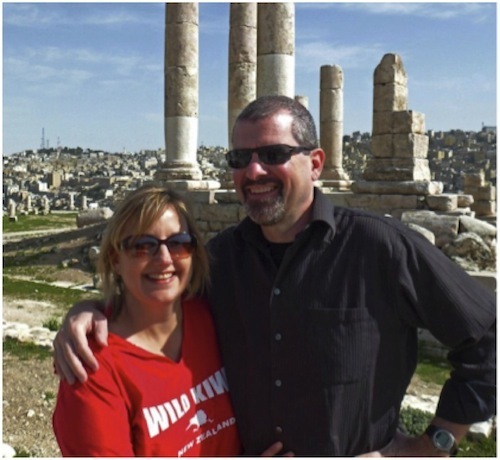
Larissa and Michael Milne
Age: 53
Hometown: Philadelphia, PA
Quote: “Get your motor runnin’, Head out on the highway, Lookin’ for adventure, and whatever comes our way.” ~ Born to be Wild, Steppenwolf
How did you find out about Vagabonding, and how did you find it useful before and during the trip?
Rolf Potts is sort of the guru of traveling the world so we had heard of him before we started our journey. Vagabonding is a motivational tool because it shows you that someone has set out to do what you are trying to do and lived to tell the tale. It made us feel like chucking it all in mid-life wasn’t the craziest idea we’d ever had, but was actually quite sane.
How long were you on the road?
We left Philadelphia for China in August, 2011 and are still on the road. So it’s been 2 plus years and counting.
Where did you go?
We touched down on six continents, starting out in Asia working our way down to Australia/New Zealand, across to the Middle East, up to Europe, back down to Africa then South America before returning to the United States after 14 months overseas. We’re continuing the adventure with a massive North American road trip.
What was your source of travel funding for the journey?
We had lived in our house for 20 years so we sold it and have been living off the equity. We are also freelance writers so that helps. The key to long-term travel though is not so much the money that comes in, but watching carefully the money that goes out. As full-time global nomads with no fixed address, our expenses are very low. Michael hasn’t even had a cell phone for several years now.
Did you work or volunteer on the road?
Our travels led to new careers as travel writers. We write regularly for the Philadelphia Inquirer as well as other media outlets. Life on the road is not the constant vacation it seems since on many days we are burrowed inside writing.
Of all the places you visited, which was your favorite?
It depends on the criteria; the food, the people, the scenery? Overall Vietnam really surprised us. We’ve always been a fan of the cuisine but the people were also so gracious. We spent a day touring the site of the My Lai Massacre from the Vietnam War when a local family of Vietnamese asked where we were from. Considering where we were standing we were hesitant at first. When we said we were Americans their reaction surprised us. They gathered around us, hugging us and shaking our hands and repeating “US-Vietnam friends now, US-Vietnam friends now.” It was such an unexpected and gratifying response.
Was there a place that was your least favorite, or moist disappointing, or most challenging?
We were shocked by the pollution on the beaches of Bali; to see this precious resource turned into an open-air plastic trash dump was quite overwhelming. It was in stark contrast to the Balinese who were the friendliest people we met anywhere. We had taken a relatively short flight of 5 hours from Australia to get to Bali. I can’t imagine the disappointment of someone flying halfway around the world to arrive there.
North Korea was a challenge. Because of the totalitarian regime it’s a controversial place to visit. North Koreans are fed a steady diet of anti-Western propaganda and have no access to the outside world. We feel the only way they’ll get exposure to a life outside their own is by foreigners visiting the country. The people were not the automatons they are portrayed as in the media and genuinely curious about life beyond North Korea.
What travel gear proved most useful? Least useful?
We’re not backpackers anymore so the most useful items were our wheeled suitcases. We thought we’d be embarrassed by them, but were gratified when we ran into 30-somethings who were complaining about their aching backs and casting envious glances at our luggage.
The least useful was a good one not to be used: our first aid kit. During the 14 month global part of our journey, despite all the dodgy water, questionable street food we ate and flying germ tubes, neither one of us was sick for even a day. When we returned to the U.S. Michael caught bronchitis within 2 weeks. Go figure.
What are the rewards of the vagabonding lifestyle?
Well we’re never bored. Almost every day is a new adventure and we’ve met so many new people around the world whom, with the magic of social media, we can still keep in touch. We’ve expanded our horizons and no longer feel constrained to live in a particular place because, well, that’s where we’ve always lived. As vagabonds we feel like the entire world is our home so we never get homesick.
What are the challenges and sacrifices of the vagabonding lifestyle?
We don’t know where we are going to live from month to month but see that more as an opportunity than a burden. As vagabonds we have no place to call home so the lifestyle is not for people who feel the need to nest. One of the sacrifices is really missing good New York style pizza. It’s hard to find so now Michael makes it for us. It comes pretty close to the real thing.
What lessons did you learn on the road?
What started as a one year lark has morphed into something grander. On the road we learned that we weren’t just taking a break from our former lives but making a break. We knew we couldn’t go back to doing what we were doing before. That’s not something we would have picked up if we hadn’t made such a drastic change.
How did your personal definition of “vagabonding” develop over the course of the trip?
Initially we were traveling too fast and seeing too much. It’s hard to resist; one day you’re in Singapore and from there you can catch a train to Kuala Lumpur, from there it’s a short flight to Cambodia, from there to Vietnam, from there to Thailand. Before you know it you’re hopping all over the place. We eventually pulled back on the throttle and try to stay places at least a month now.
If there was one thing you could have told yourself before the trip, what would it be?
Don’t put all that crap in storage. Even though we gave away most of our possessions, we still had enough of the detritus of life to fill a 10’ by 10’ storage unit. After 14 months out of the country we returned to the unit, rolled up the door, took a gander at all the junk that was too “important” to throw away, (seriously, why did we have so many lamps?), slammed the door back down and walked away. We just didn’t want to deal with it. Six months later we returned and finally emptied out the unit and got rid of the last vestiges of our former lives. It was so cathartic.
Any advice or tips for someone hoping to embark on a similar adventure?
Don’t wait for the perfect time to see the world. It may not come. We were in our 50s before we took off and boy do we envy the 20-somethings we meet who didn’t get sucked into a conventional life. Maybe they will someday, but they’ll always have their grand adventure to look back on and hopefully repeat. To people closer in age to us we ask “What are you waiting for? Retirement?” The heck with that. Go now when you’re relatively young and healthy. The tag line of our blog at Changes in Longitude is “Just go already!” That’s our advice. And wear comfortable shoes.
When and where do you think you’ll take your next long-term journey?
Since we’re still on the road it’s more a question of where we want to see next. There are still a few places in America we haven’t been, so we’ll see those first then perhaps head to Japan to start another circumnavigation of the globe. But since we don’t plan more than a month in advance, who knows?
Read more about Michael & Larissa on their blog, Changes in Longitude, or follow them on Facebook and Twitter
Website: Changes in Longitude
Twitter: @changes_long
Are you a Vagabonding reader planning, in the middle of, or returning from a journey? Would you like your travel blog or website to be featured on Vagabonding Case Studies? If so, drop us a line at casestudies@vagabonding.net and tell us a little about yourself.
Original article can be found here: Vagabonding Case Study: Changes in longitude: Michael & Larissa Milne
June 18, 2014
Keep calm and collect miles: Miles, points, and last minute plans
Vagablogging :: Rolf Potts Vagabonding Blog
My husband and I are not very good planners but we like it that way. Many times we are minutes away from checking out of one hotel and have not yet made a plan for our next one. It happens quite frequently in fact.
Or, as is the case today, our Thai visa is days away from expiring and we don’t yet have a plan of where to go next.
How can we be so care-free and unplanned?
For us the answer is frequent flyer miles and hotel points.
Flights
Last minute plans can get expensive, especially when you’re talking about flights. But the convenient thing about frequent flyer miles is that not only are the prices fairly fixed and consistent, there is also a likelihood that availability suddenly starts to open back up last minute.
You see when award flights are concerned, you’ll find the best availability either a few months before you plan to travel or mere days before you plan to travel. This is because some people will book tickets speculatively, then cancel the tickets when the time approaches if they realize that they are unable to travel. This means that last minute planning can actually reveal similar availability as advanced planning.
However, there are a few down sides to this last minute planning strategy. Most airline mileage programs will charge a fee of around $75 for last minute award bookings. In this case “last minute” refers to bookings made less than 21 days in advance.
$75 and a handful of frequent flyer miles is still more affordable than paying for a thousand dollar or more flight, not to mention more affordable than a full-fare ticket with minimal restrictions for post-booking adjustments. And if we think of that $75 fee as the price we pay for flexibility, in our opinions at least, it’s worth it to be able to make our plans as we go.
The other down side is that it can be a bit of a gamble.
For instance on one occasion we had plans to meet friends in Chile. Because of a few changed plans we didn’t book our tickets until the very last minute (a day or two before traveling). Unfortunately in this instance, availability didn’t open up by the time we knew we’d need to leave, so we ended up routing all over the place. We flew from NYC to Toronto to Asuncion to Buenos Aires and then finally to Valparaiso where our friend was waiting for us. While at the airport in Toronto we saw that availability was opening up for a direct flight from Toronto to Santiago. So we attempted to change our flights to this more convenient option, but alas, our layover wasn’t long enough for the necessary process and we had to follow through with our miserable series of connections.
Still, it got us to Santiago affordably and at the end of the day, that is our goal. We’ll sacrifice some comfort for affordability and flexibility when we need to.
Lets contrast that less-than successful anecdote with a more successful one. In another instance we arrived in Thailand quite ignorant of the visa details. Just by chance I thought to glance at the stamp in my passport and realized that because we’d entered via land (from Malaysia) rather than by air, our visa only allowed a 15 day visit. This realization was made a few days before our visa was to expire and we did not feel like we’d seen much of Thailand at all, so we had to plan a “visa-run” quickly.
We wanted to do this visa run by air so that we’d get the 30 day visa on arrival rather than 15 days so we hopped online and booked a roundtrip award ticket to Sri Lanka and back.
We ended up loving Sri Lanka. Without miles, our visa-run options would have been minimal. Again, in this scenario British Airways technically charges a fee around $75 for bookings made less than 21 days in advance, but in our opinion, it was worth it to visa-run somewhere we were truly curious to see and return for another 30 days in Thailand.
Hotels
The last minute planning strategy is much easier when it comes to hotels. We’ve made award bookings online ten minutes before check-in with no greater hassle than needing to show the reference number to the hotel if the booking hasn’t yet showed up in their system.
The value of “last minute” planning
Sometimes there’s a deal you just want to jump on or sometimes there’s a place you hadn’t realized you’d love so much and you want to extend your stay. The nature of travel is that you just don’t know all the pieces of what’s ahead. Still, planning is not impossible. It’s quite possible.
But is it preferable?
For someone who feels anxious without a plan, perhaps it is. But there are certainly some people for whom the greater anxiety comes from a lack of flexibility. For these people, it’s nice to know that flexibility doesn’t have to break the bank.
As far as hotels are concerned, last-minute planning is rarely a problem. And where flights are concerned, it may cost you ~$75 and an extra half day to follow the last-minute route. So it’s all a matter of what that flexibility is worth to you. But at least by keeping a collection of miles on hand, last minute plans are not going to cost you hundreds as would easily be the case with paid tickets.
How do I keep miles on hand?
The “how” of keeping miles on hand does require a little planning but luckily there are resources.
For instance this Complete Guide to Miles Earning with Credit Cards is the perfect how-to to start with.
I recommend visiting the complete guide but the basics are as follows. Provided you have a credit score in the 700′s, you may consider applying for a variety of travel rewards cards. Some of these cards will earn miles directly into your mileage program account and others will earn points that can transfer to a variety of hotel or airline programs.
But all of the recommended travel rewards cards generally come up with a sign-up bonus to get you started out. In most cases the bonus is enough for a round-trip international flight. And if you learn how to use your miles wisely, perhaps you can go even further with those bonuses.
Application Strategies
The reason I’ve said that this can take some planning is because keeping a healthy credit-score requires spacing out credit-card applications. The credit bureau has reason to worry when a person looks desperate for credit. And applying for a slew of cards all at once will definitely make you look desperate.
That’s why we recommend spacing applications out by no less than three months. Ultimately, credit score does matter and is definitely worth intentionality.
You can find out all the details about how travel rewards cards relate to this in our post about improving your credit score.
Conclusion
Ultimately, keeping a “safety fund” of miles is much like keeping a “safety fund” of money. If you are budgeting in such a way that you have money set aside for those occasions where a last minute plan is needed, than that puts you in a position to keep calm and care-free.
But maybe you can make that monetary “safety fund” last even longer by also having a “safety fund” of miles and points on hand. After all, that is the currency of travel and thanks to travel rewards programs and credit cards, you can save them up simply by spending on the cards that reward you.
Original article can be found here: Keep calm and collect miles: Miles, points, and last minute plans
June 17, 2014
Vagabonding Case Study: Ivana Greslikova & Gianni Bianchini
Vagablogging :: Rolf Potts Vagabonding Blog
Ivana Greslikova & Gianni Bianchini
Age: 34 (Ivana), 44 (Gianni)
Hometown: Presov (Slovakia), Martina Franca (Italy)
Quote: ”Not all those who wander are lost” by J.R.R.Tolkien
How did you find out about Vagabonding, and how did you find it useful before and during the trip?
We read about the book on one of the travel blogs we were following and we bought it later on Amazon. Apart from some valuable, practical tips it encouraged us to start our long-term travel as soon as we could and ignore all the excuses we had been inventing before.
How long were you on the road?
Since October 2013.
Where did you go?
We’ve been living for in Thailand, Laos, Philippines and Borneo, both short- and long-term.
What was your job or source of travel funding for this journey?
We were saving for this long-term trip while working in Frankfurt, Germany; Gianni was a videogame translator and Ivana was a teacher in a bilingual kindergarten.
Did you work or volunteer on the road?
Apart from three days volunteering with the foundation ‘Bring the Elephant Home’ in Thailand, where we helped to recreate the natural habitat of elephants and received free room and board in return, we have mostly been travelling using our savings.
Of all the places you visited, which was your favorite?
We love Thailand the most so far, perhaps because it was the first Asian country we ever visited and we were wowed by everything we experienced there.
Was there a place that was your least favorite, or most disappointing, or most challenging?
Laos is a country that we feel needs to get one more chance. The truth is, we visited the touristy places and did not give a chance to the more remote areas. Hopefully we can explore the south of the country one day to get more objective opinion.
Which travel gear proved most useful? Least useful?
Apart from our ‘must have’ cameras and laptops that we use daily for our online work, we cannot imagine our travel without our carry-on backpacks and waterproof bag. The least used have been swimming goggles that we’ve only used once.
What are the rewards of the vagabonding lifestyle?
The incredible feeling of freedom that we did not have back home while doing our regular jobs. The fact we can schedule our time, the number of wonderful people we meet and the number of new things we learn from our research and direct contact with new cultures and locals. One of the most rewarding things is to face and overcome our fears, some of which we even didn’t know about.
What are the challenges and sacrifices of the vagabonding lifestyle?
Above all what we sacrifice is that we don’t see our families and old friends so often. Also, we have to adjust to sometimes less than tasty food because there is no other option. Otherwise, we feel we are gaining more than losing by travelling.
What lessons did you learn on the road?
We’ve learned that everything is relative and we cannot compare the challenges we are facing on the road to our safe, comfortable life we lived back in Europe. Constant comparing and whining just ruins all the benefits the road offers you.
How did your personal definition of “vagabonding” develop over the course of the trip?
We are more aware of the fact that to be a vagabond is not all about the adventure and free lifestyle when you do what you want, as we imagined before. To be on the road has taught us to be more responsible, compassionate and to respect ourselves and others. And most of all, to be happier and more grateful.
If there was one thing you could have told yourself before the trip, what would it be?
Do not hold on to any of the information, prejudice or common opinions you have created or you have been told about the places you’ll visit and the people you’ll encounter. The road will give you the best lessons and exams.
Any advice or tips for someone hoping to embark on a similar adventure?
Make travelling a priority and put all your effort into achieving a full, rich life on the road and living in harmony and balance with it. Quit your bad habits change your lifestyle and save money. There are many more things out there to do and to see than just a pack of cigarettes with a beer in your favourite pub.
When and where do you think you’ll take your next long-term journey?
The next leg of our trip will start in the middle of May, when we will set off to Indonesia, followed by Cambodia. From July to September we will visit our families in Europe and then back in Asia again.
Read more about Ivana & Gianni on their blog, Nomad Is Beautiful, or follow them on Facebook and Twitter
Website: Nomad Is Beautiful
Twitter: @NomadBeautiful
Are you a Vagabonding reader planning, in the middle of, or returning from a journey? Would you like your travel blog or website to be featured on Vagabonding Case Studies? If so, drop us a line at casestudies@vagabonding.net and tell us a little about yourself.
Original article can be found here: Vagabonding Case Study: Ivana Greslikova & Gianni Bianchini
June 16, 2014
Visiting Sulawesi Indonesia: Guide recommendation for Dodo Mursalim
Vagablogging :: Rolf Potts Vagabonding Blog
We spent a couple of weeks researching Sulawesi and found very little information for independent travel on the island. Then, I lucked into Dodo Mursalim’s contact details on a TripAdvisor forum.
Dodo turned out to be a gold mine of information and he bent over backwards to help us do Sulawesi our way.
He rented us his little house behind the mosque for a fraction of what the cheapest hotels in Makassar could offer, and it has a kitchen and washing machine! He arranged an 8 seater van rental for us for the price of a much smaller car through any of the agencies we’d contacted on the island (car rental on Sulawesi can be expensive!) and he was willing to let us self drive, which is not commonly done on this island, with terrible roads and questionable signage. He taxied us all over Makassar for three days out of the goodness of his heart, helped arrange our three days on Samalona island, and sent us off on our road trip armed with his recommendations for hotels in various towns and a list of phone numbers of contacts in different places.
Dodo has an almost uncanny network of friends and cohorts on Sulawesi.
Four separate times during our very unplanned journey around the island, complete strangers would walk up, shake our hand and say, “Mr. Dodo says, “Hello!” He wanted me to make sure you knew that his recommendation for a certain hotel is full… or can I help you with a guide… or do you need help finding….” He was attentive to the highest degree, calling to check in with us, calling ahead of us to be sure that the arrangements we had made (independent of him) and just mentioned in passing, were properly sorted and awaiting us suitably. We have never encountered a tour guide of his calibre anywhere in the world, but certainly not in the developing world, where we expect things to go a little haywire.
Nothing goes haywire on Mr. Dodo’s watch; nothing.
He also does magic tricks, tells jokes, and speaks nearly perfect English. If you’re inclined to an adventure on Sulawesi, have Mr. Dodo be your man on the ground in Makassar. He can arrange any journey you want, guided, or solo, and he’ll take care of you like you’ve never been taken care of before.
Contact info for Dodo Mursalim
donow77(AT)hotmail(DOT)com
https://www.facebook.com/dodo.mursalim
http://dodopenman.blogspot.com (visit this page and you’ll see our picture and entry in his guestbook!)
Original article can be found here: Visiting Sulawesi Indonesia: Guide recommendation for Dodo Mursalim
June 15, 2014
Sense of place is tied to the people who live there
Vagablogging :: Rolf Potts Vagabonding Blog
“To me, a sense of place is nothing more than a sense of people. Whether a landscape is bleak or beautiful, it doesn’t mean anything to me until a person walks into it, and then what interests me is how the person behaves in that place.”
Mark Salzman, in They Went: The Art and Craft of Travel Writing (1991)
(1991)
Original article can be found here: Sense of place is tied to the people who live there
Rolf Potts's Blog
- Rolf Potts's profile
- 323 followers


